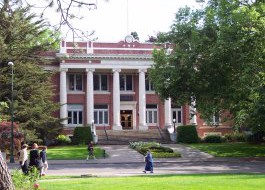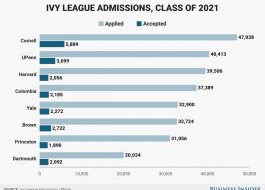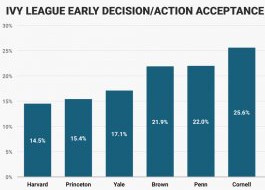
Growing up and attending school in northern Georgia, Valentina Garcia Gonzalez exuded confidence in the academic arena.
She was accepted into gifted classes and took more than two dozen Advanced Placement (AP) courses at Berkmar High School, a public school in Lilburn, Georgia, right outside Atlanta.
But that confidence began to waver when she was applying for colleges and realized that Georgia's best public schools wouldn't let her in for one reason.
Her immigration status.
"Am I less of a student? Am I less worthy?" she recalled. "Why don’t I deserve it the way" other students do?
Today, at 19 years of age, she is a freshman at an Ivy League university, but her road to acceptance at one of America's top schools hasn't been easy.
Garcia Gonzalez entered the US illegally in 2002, traveling with her parents as a 6-year-old.
Now, there are two barriers to a college education in Georgia for undocumented students such as Garcia Gonzalez, and the Georgia Board of Regents instituted both in 2011.
Policy 4.1.6 effectively bars undocumented applicants from applying to Georgia's top five public universities: the University of Georgia, Georgia State University, Georgia College and State University, Georgia Regents University, and Georgia Institute of Technology.
Policy 4.3.4 bars undocumented applicants from receiving in-state tuition.
Other US states have different rules about tuition and application eligibility for undocumented students, but Georgia sets itself apart from many states by barring immigrants who entered the US illegally from selective universities and barring them from receiving in-state tuition.
 Valentina Garcia Gonzalez
Valentina Garcia Gonzalez
Even though she attended high school in Georgia, Garcia Gonzalez knew nothing about these policies. She says she didn't try to hide her status, and even "came out" as undocumented to her classmates her freshman year at Berkmar.
"I came out because of anti-immigrant sentiment," she said.
Her school was predominately black and Latino, but she was the only one to announce her undocumented status.
"I thought it was weird that I was the only one who came out," she said. "But I came to understand later on that it was the stigma of being undocumented; being seen as less than who you are because you didn’t have a piece of paper."
Undaunted by appearing different, she excelled in school and took seven AP courses — the maximum allowed — in her senior year.
She started applying to colleges, unaware of the bans that would prohibit her from attending schools or receiving financial aid.
She first found out about her ineligibility for financial aid when she attempted to submit the Free Application for Federal Student Aid (FAFSA) form for federal financial aid.
 © 2015 Bryan Carvajal
© 2015 Bryan Carvajal
She enlisted the help of Freedom U, an organization that describes itself as a modern-day freedom school, to help her navigate the college application process.
Freedom U offers college-level classes, financial-aid assistance, and leadership development classes for undocumented students in Georgia.
She discovered she was ineligible to receive federal financial aid and barred from Georgia's most selective public universities.
Unable to apply to a top public university in Georgia, she weighed her options. If she attempted to apply to a private school — Emory University, for example — and was accepted she would have to pay the $45,000 a year it costs for tuition.
At the time she applied, Emory didn't offer need-based financial aid to undocumented students. That policy changed recently.
She said that for the first time in her life she felt isolated. By cultural standards, Garcia Gonzalez says she is most definitely American. Born in Uruguay, she moved to Georgia at 6 and lived there for the next 14 years.
She has grown up among her friends and classmates, taken the same classes, and gets the same pop-culture references. But as all of them were preparing for the next step in their lives, she was stuck, unable to move forward with her college plans.
 Valentina Garcia Gonzalez
Valentina Garcia Gonzalez
The policies in place in Georgia effectively constitute modern educational segregation, according to Freedom U.
Garcia Gonzalez started working with Freedom U her senior year in high school and, at their recommendation, took a gap year between her senior year in high school and freshman year in college to aggressively pursue college applications.
Garcia Gonzalez said that after learning at the 11th hour that attending a good public university in Georgia would be impossible, she thought community college was her only option. But looking at her academic success, Freedom U pushed her to work to get into a selective school.
With Freedom U she toured college campuses during her gap year, and applied to nine different schools. She was accepted into Dartmouth College and started her freshman year this past fall. She's considering studying neuroepidemiology, a field that looks at the characteristics and contributors to neurological diseases in human populations.
Perhaps surprisingly, Garcia Gonzalez has experienced hateful comments about her undocumented status in ostensibly liberal New Hampshire.
She says she considered running for a student-body position but decided against it after received harassing messages claiming she'd be deported. She also noted, with surprise, that Dartmouth was more conservative than she expected. But she remains undaunted in her pursuit of success and is reconsidering a run in student government.
"I can deal with conservatives on campus," she said.




